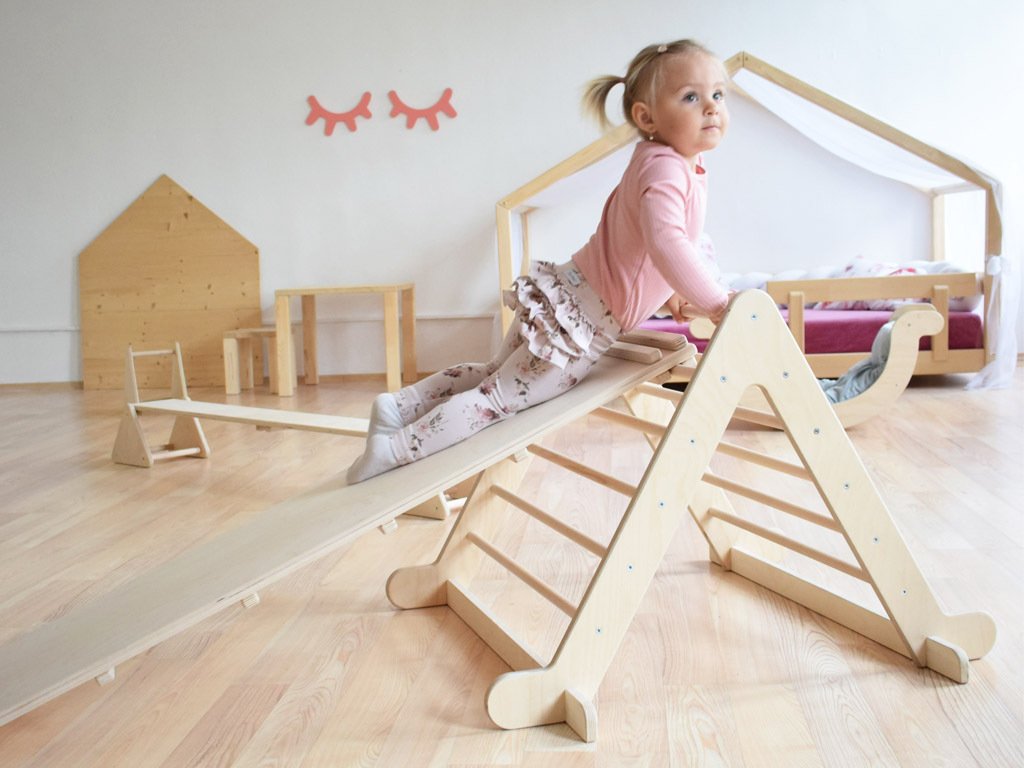While puzzles and math may be gripping enough for your child, the Pikler method of education seems best suited to help kids develop their intellectual and motor skills. Since children’s physical and mental abilities develop together, the optimal educational toys for toddlers are the ones that involve their bodies.
This article will introduce the Pikler triangles as one of the best presents to make for your child. We shall describe their essential components and how they work. We shall also point out their advantages and indicate how they correlate with the Montessori toys.
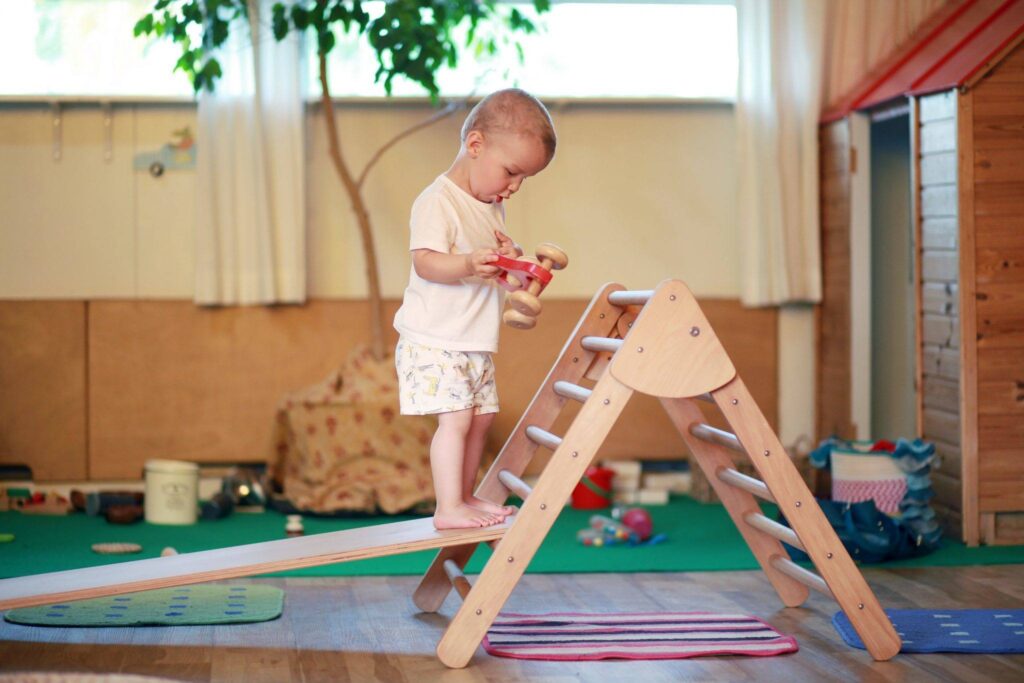
Pikler Approach
Emmi Pikler was a twentieth-century Hungarian pediatrician who became most famous for designing a climbing triangle to assist her young patients and other kids in improving their elementary motor skills. Kids love physical activities, and they use the latter to explore the world around them and gain better control over their bodies.
Pikler took that as a starting point for designing the most effective educational toys. But her inventions happen to serve other purposes as well. For example, they increase children’s spatial self-awareness, boost their creativity, and help them build their self-confidence in the process too.
Apart from that, toddlers’ furniture is an excellent tool for improving kids’ social skills and helping them discover the boundaries in their social interactions. Incidentally, Montessori and Pikler toys and games have proven to be the most effective strategies for achieving those goals. And since this article focuses on Pikler’s invention, we should first explain how it works.
Pikler Triangle
Essentially, this is a toy that kids can climb, slide and use for their social games. It helps them master their physical balance and get into intricate interpersonal interactions with their peers. Besides, a Pikler climber also includes ladders that are simple and safe enough even for babies of six months. However, the toy is most suitable for children of one to six years of age to help them:
- Practice their fundamental motor skills
- Master their spatial coordination
- Increase their physical strength
- Boost a variety of mental skills, such as memory, logical thinking, and creativity
In addition, these climbing toys are very compact, and they are light enough for adults to move around as well. And you may use them in and out of the house too. This way, the climber is quite a practical toy: you can set it up in your kid’s room and move it to the garden when the weather is good. You can even pack it up and take it with you when you go camping. When dismantled, it is small enough to fit into a standard car.
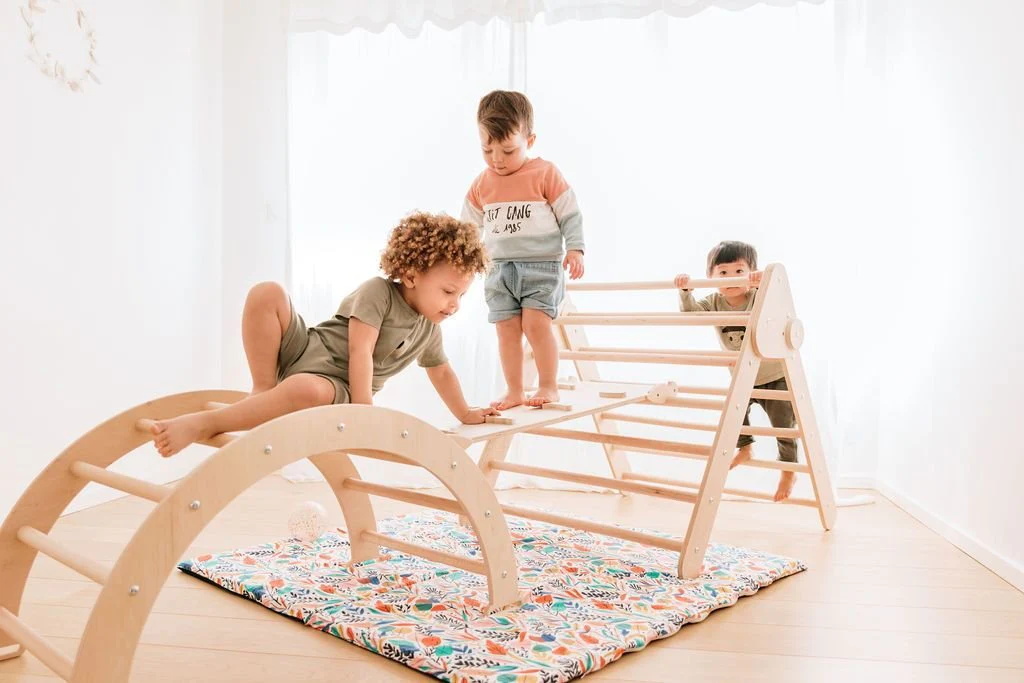
Essential Components
Pickler triangles consist of several parts, and each component is most suitable for different developmental purposes. For this reason, each one of them becomes particularly important at various stages of child development. Therefore, you should consider your child’s developmental challenges when assembling your climber. You can browse the internet to find the parts separately for the purpose or buy them as a set to use it differently as your kids grow up.
Since Pikler triangles have become quite popular these days, you can now find climbing furniture in all sorts of shapes and structures to make the educational process more diverse and target specific abilities and skills too. Still, all of them include the following parts:
Climbing Triangles
The most significant component is a triangular climber with rungs on each side to provide an infinite variety of ways your kids can play with it, depending on their ages. For example, a baby can learn to pull itself up while holding onto the rungs. That will build the baby’s muscles and help it practice grasping and holding objects with its hands.
Toddlers can use the rungs to climb up the triangle and learn their physical limitations in the process too. But it is the climbing down that is particularly tricky for a kid of that age to do, and the triangle allows him to master the skill safely. This way, your toddler will learn how far he can go and manage his anxieties as he continues to master his physical balance.
Later on, when your kid learns to stand, he can hold onto a rung to stabilize himself, and he can choose which one to use for the purpose, depending on his height and physical needs. Ideally, the triangle should be not less than thirty inches high, and you can even buy two climbers of different sizes for the best effect.
When your kids have mastered all the essential motor skills, they can start playing monkeys on the climber, and they most certainly will. Climbing, swinging, and turning on the triangles can be a lot of fun and will also improve their spatial coordination and boost their sense of self-confidence as they begin to apply their phantasy to accomplishing a variety of bodily movements.
Apart from that, children can use a Pikler triangle for alternative, non-physical purposes, especially when they reach the age of social play. It can be a cave, a fortress, or a house, depending on the game they decide to play. While letting them practice their social skills that way, the toy will also help them use their imagination and boost their creativity as they think of multiple scenarios in which they can use it as a stage.
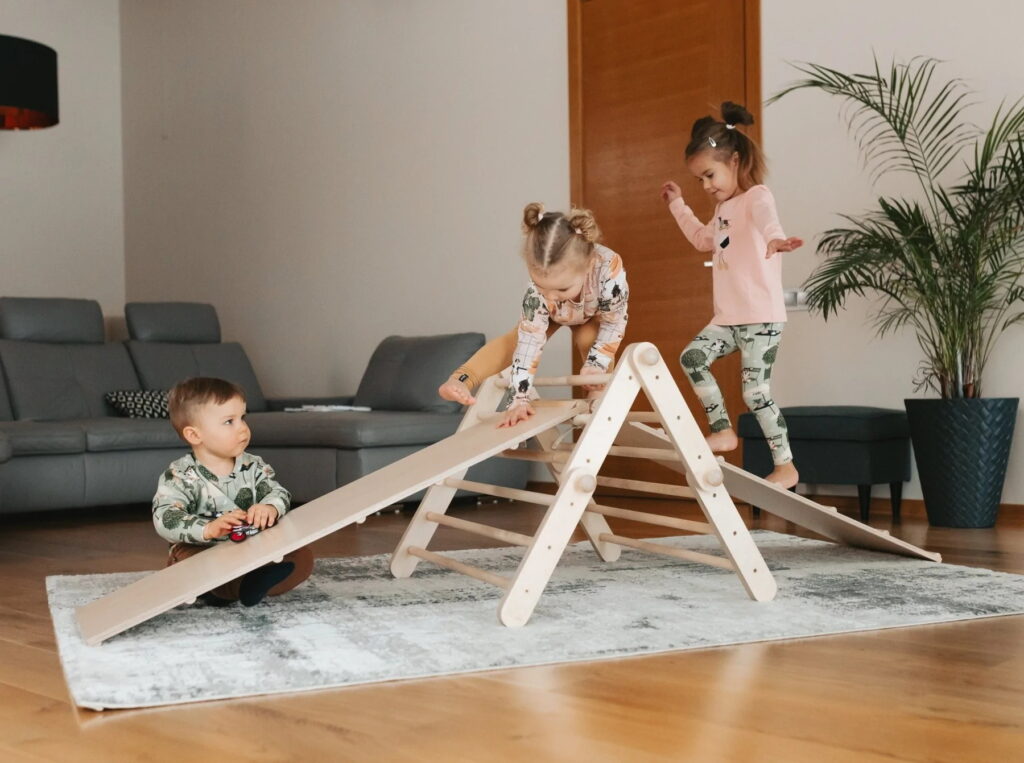
Slides
No less significant for the child’s physical and mental development and amusing for his play is the slide attached to the climber, which has a ladder on its opposite side. It will help your baby learn to hold itself up in the sitting position, and it will also be a good way for the two of you to socialize as you help it slide down safely.
Later, your toddler will try to crawl up the slide, which will build his muscles, help him learn to toddle better, and it will be fun to watch as well. And when he starts walking, he can use the ladder to practice climbing and maintain his physical balance. It is advisable to adjust the ladder slide’s height and angle to your growing child’s physical needs so that he can benefit from it best and develop self-confidence too.
Rock Climbers
As an alternative to the previous one, this component has imitation rocks attached to the opposite side of the slide, and it will serve different purposes as your child grows up. At the earliest stage, the rock climber will be an excellent tool for the baby to improve its grasping abilities.
Later, they will let him practice climbing and balancing himself in a challenging physical environment. That will also work on his imagination and creativity and allow him to become aware of his limitations. And when your kids reach the age of four to six and start turning their physical environment into a stage for their theater, the rock climber will become a basis for the most magical scenarios in their social play.
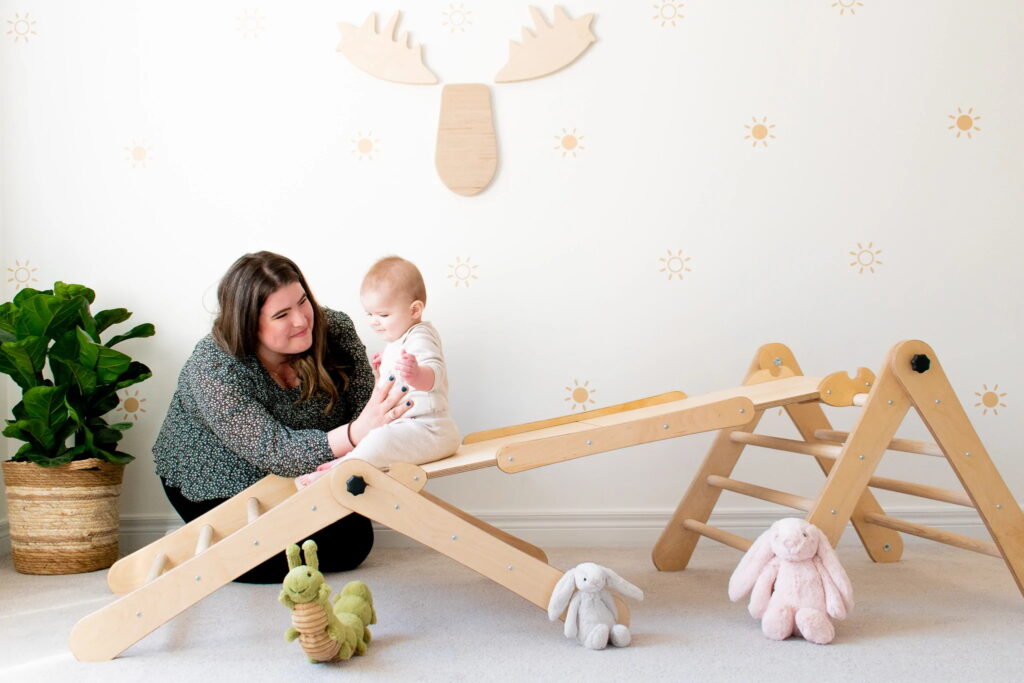
Pikler Triangles and the Montessori Method
Even though Pikler climbers do not form a standard part of the Montessori education, they are perfectly compatible with it, and the two enhance each other immensely. For example, the latter condemns the parents’ overprotective involvement in their children’s development and provides kids with ample opportunities to acquire and polish their life skills independently through play.
And that is what Pikler triangles do as well. They create physical circumstances for your kids to improve their fundamental motor, mental and social abilities by playing on their own in a physically safe environment, as long as you keep an eye on them, just in case. As a positive side effect, these toys also strengthen healthier and warmer ties between you and your children since you never become their mentor in the process.
Pikler and Montessori essentialness
Children’s motor skills are essential in their own right, and they become a foundation for mental development as well. Toys that help improve physical abilities are the best tools for children’s successful overall development.
Pikler triangles work best to that effect since their target all the essential physical and mental skills, enhancing the child’s social and personality development in the process. You can visit our webpage to find or design the optimal educational toys for your children to grow up strong, healthy, and happy.

